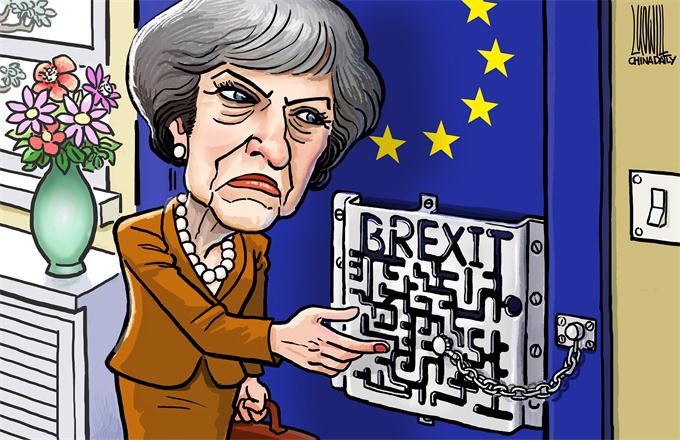Belt and Road Forum a historic test
Can help fulfill dream of shared destiny

Khalid Rahman, director general of the Institute of Policy Studies, Islamabad
The China-Pakistan Economic Corridor, as a "flagship project", is one of most crucial parts of China's Belt and Road Initiative, which has both economic and geopolitical goals. The impact of the Belt and Road Initiative can be gauged from the fact that once completed it will include more than 60 countries, more than half of global GDP, three-fourths of global energy reserves and more than 65 percent of the world population.
Due to its very substantial geographical location, the CPEC will serve as a primary facilitator in achieving the goal of global connectedness. On a regional level, it will gradually act as the center of economic activities with plans turning into progress. It will not only benefit Pakistan's economy by creating more than 700,000 jobs in the country and adding 2-2.5 percent to its GDP; its larger impact will be evident for regional neighbors as well.
There is good potential to link the CPEC with regional countries. The current focus is on its expansion toward the West: Afghanistan, Iran and Central Asia. Its expansion toward the East may take some time as India has occasionally expressed reservations against it, mainly on technical grounds. Yet as things are progressing, the chances that the CPEC could play a catalyst's role in even bringing the two countries closer are very much there.
Russia has vital interests in this region as well, as an active partner of both China and Pakistan. The Karachi-Lahore gas pipeline worth $1.7 billion has been pledged by Russia. And Russia, China and Pakistan have decided to work together to restore peace in Afghanistan.
Realizing the importance of the CPEC for Central Asia and Russia, their leaderships have shown greater interest in developing more cordial and cooperative economic and geostrategic relations with Pakistan in areas such as trade, energy sharing and tourism. Keeping in view China's economic and geostrategic interest in Central Asia and Russia, it is a vital development. The increased economic cooperation between Pakistan and Central Asia and Russia will also strengthen Pakistan's role in regional organizations such as the Shanghai Cooperation Organization.
Iran, too, has been playing a very significant role in regional cooperation through the CPEC, and it is significant that Chabahar and Gwadar ports, once portrayed as competitors, have now been declared as sister ports. Given the changing scenarios, the Iranian leadership hinted that China, Pakistan, Iran and Russia should cooperate more for regional stability. And China-Russia-Iran-Pakistan cooperation is being discussed in this context.
Given these scenarios of regional connectivity, there is a definite chance the CPEC will sow the seeds of more comprehensive regional connectivity and fulfill the dream of shared destiny.
Drift toward geopolitics can be counterproductive

Swaran Singh, a professor at the School of International Studies, Jawaharlal Nehru University, New Delhi
Right from the beginning, the Belt and Road Initiative has been the subject of extreme interpretations, which either border on sloganeering by one camp which belches out unacceptable ridicule or the other side that churns out slavish eulogies. The biggest challenge for the Belt and Road Forum for International Cooperation, therefore, lies in providing much needed clarity on not just the Belt and Road "paradigm" but also on its current outline and its tools and tactics.
Addressing skeptics remains the most formidable task for building Belt and Road "partnerships" based, not on short-term development needs, but on enduring commitments arising out of mutual trust and mutual benefit. Being in the lead in unfolding this historic metamorphosis, the onus lies with China's leaders to show that the Belt and Road Initiative's goal is beyond a knee-jerk reflex driven by compulsions to invest China's excessive foreign exchange reserves.
For the Belt and Road Initiative to succeed in re-writing history, Beijing must first convince all the major players so that the opportunity to herald outside-the-box strategies is not allowed to become hostage to 20th century obsessions with geopolitics. The Belt and Road juggernaut seems unstoppable now; so by restricting it to loyal followers alone may dwarf its possibilities.
Especially, in the context of US President Donald Trump's whimsical twists and turns casting doubts on Washington's leadership to address global threats, several countries have become skeptical about China's ambitions, because they assume the initiative is solidly backed by its financial and technological capacities for implementing hundreds of projects. And though there is no dearth of takers of such benefits, it will be myopic to privilege quantity over quality.
India is not the only country to follow this wait-and-watch policy.
As international relations shift from inter-state to inter-societal channels thanks to the advancement of information technology, the old-fashioned focus on demarcated borders and military alliances emphasizing "divisions" are fast giving way to logistics of "connectivity".
The Indian prime minister's emphasis on highways and information technology expressways, and culture, commerce and connectivity shows that the Indian leadership is aware of such shifts. This is not to say the hangover of geopolitics no longer colors the Indian leadership's visions about the Belt and Road economic corridors. In their ideal state, instead of being tools of territorial domination, the corridors constitute multi-model, multi-nodal "processes" grounded in the framework of multiple ownership and multiple beneficiaries.
It is thus for Beijing to ensure these economic corridors are seen as "channels" that seek to connect economic agencies to various hubs and nodes that are ordained with concentrated presence of economic actors and resources. Only if all the stakeholders begin to see the Belt and Road Initiative in this pure form of geo-economics can it become their path to prosperity and peace.
Any actual or perceived drift toward geopolitics will not just be futile but counterproductive.



















